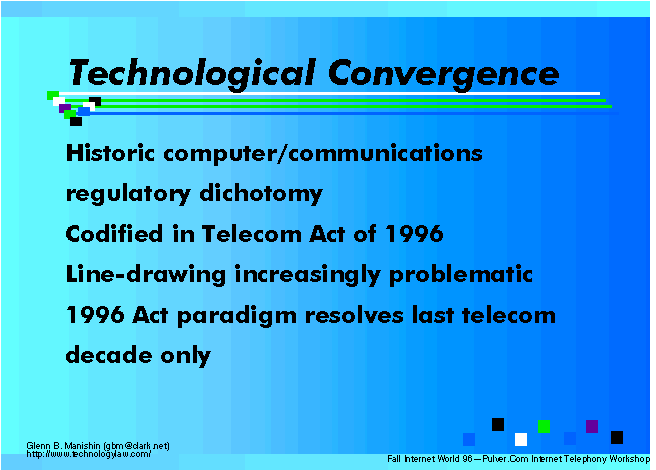
The FCC has grappled with the convergence of computers and communications before. Nearly two decades ago, the Commission's landmark Computer II decision recognized a fundamental regulatory distinction between "basic" telecommunications services and "enhanced" services utilizing computers for storage, retrieval and database-accessed information. In short, plain old telephone service, or "POTS," is treated differently from information services, with the latter exempt from federal (and state) regulation.

The Computer II paradigm has been an unparalleled success, ushering in an era of robust growth and expansion of online information services, including the Internet. As a result, the basic/enhanced distinction was codified in the Telecommunications Act of 1996, and has been adopted by many other nations as their model for communications regulation.
But now, the Computer II model is under attack, as the PSTN is carrying more and more data "bits," and the Internet is carrying voice, video and other telecommunications-like packets. From a regulatory perspective, some have argued that "a bit is a bit" and "a pipe is a pipe" -- meaning that similar regulatory treatment should be accorded to similar functionalities, regardless of the underlying network technology. (Interestingly, on the PSTN data is just another kind of voice traffic, while on the Internet, voice is "just another kind of data.") At the very least, this obviously makes the line-drawing inherent in Computer II increasingly problematic in an era of technological convergence.
From a regulatory perspective, the enshrinement of the Computer II model in the 1996 Act illustrates that the Act is basically an historical statute, settling the contested issues of the 1980s -- Bell company entry into long distance, local telephone competition, etc. It simply does not provide the answers to the regulatory questions that will increasingly arise over the next decade. As a result, in the absence of new, "son of telecom act" legislation -- something Congress will be hard-pressed to achieve, given the long legislative battles finally yielding the 1996 Act -- Internet-centric companies must expect, and be prepared for, a series of continuing regulatory squabbles as the traditional telecom providers seek to use their influence to fight a rearguard action against the competitive threat posed by a robust, "all-purpose" Internet.